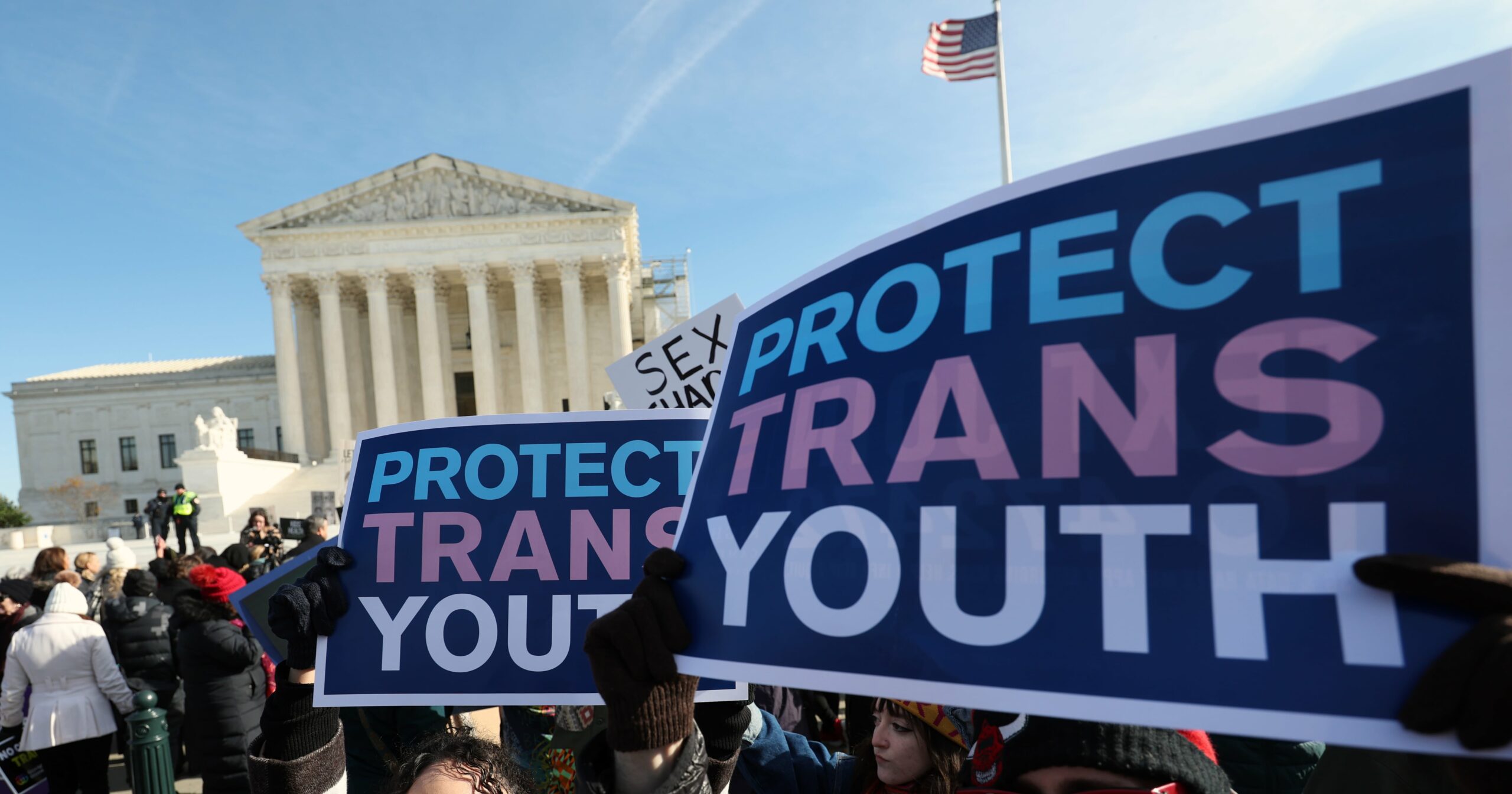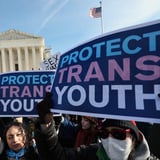As a parent raising a transgender child in Colorado, I feel immense gratitude for the protections our state provides. We’ve had no challenges navigating healthcare or school policies. None of our friends or family have turned away from us or misgendered our child. I know how incredibly rare our experience is, given that I’ve had multiple conversations with parents I’ve never met who live in red states, have transgender children, and are considering uprooting their whole lives for the safety of their child. I’ve never not cried during one of these conversations.
I’m livid that every transgender child in this country doesn’t get the sort of institutional support that mine does.
I’m livid that every transgender child in this country doesn’t get the sort of institutional support that mine does. And, given the reelection of Donald Trump, I fear this is only going to become more common. Project 2025, a conservative blueprint for the Trump administration, advocates for a binary definition of sex, wants to remove terms like “sexual orientation” and “gender identity” from federal laws, prohibits federal funding for gender-affirming care, and promotes research into the “negative effects” of such care, among other efforts to undermine the rights of LGBTQ+ families.
Arguably, though, state laws are going to make the big difference. The 2025 legislative season is barely underway, yet nearly 120 anti-trans and anti-LGBTQ+ bills have already been introduced across the country. These laws aim to restrict healthcare, education, and public accommodations rights. A 2024 study showed that such laws directly correlate with an increase in suicide attempts among LGBTQ+ youth. Despite heartbreaking testimonies from doctors, parents, and LGBTQ+ folks, many red-state legislators continue to push these harmful measures forward.
For families like mine, living in a blue state provides a sense of security. But the fight for equality is far from over. Now more than ever, blue states have a responsibility to lead – not only to protect their residents, but to serve as a counterbalance to a potential federal rollback of rights under a Trump administration.
The Role of Blue States as Leaders in Resistance
“Blue states have not only the power but also the responsibility of advancing policies that can help protect the most vulnerable communities,” says Ezra Levin, co-executive director of Indivisible, a progressive grassroots movement. Levin points to governors in states such as California, Colorado, and Illinois as examples of leaders who are already engaging in proactive measures, including calling special seasons and forming coalitions like Governors Safeguarding Democracy.
“If you are lucky enough to live in one of the 15 states with a Democratic trifecta, you have representation that can do something to push back against the coming policies,” Levin says. “But we have to push our elected officials to create the policies we want to see.”
For families like mine, these aren’t just talking points; they’re lifelines. These policies allow LGBTQ+ folks to access care without fear and to show up authentically within their communities.
Harnessing Local Power Is Key
According to Nadine Bridges, executive director of the LGBTQ+ rights organization One Colorado, local politics are extremely impactful for queer folks’ lived experiences. “We don’t know what will happen at a federal level, but we do know if we want to impact long-term change, we have to start on the ground with things like school boards, city councils, or even your sheriff,” she says. “Day-to-day lives are impacted more by what’s happening locally.”
We saw the power of local advocacy firsthand in Colorado in 2024 when conservative activists proposed 30 ballot initiatives aimed at restricting LGBTQ+ rights. These included a ban on gender-affirming care for minors and attempts to prevent trans girls from playing school sports. Thanks to sustained advocacy at city and state levels, none of these measures made it onto the ballot. This victory was a reminder of the power that exists within local governance – power that, when harnessed, can shield vulnerable communities from harmful policies.
“Your power exists where you are,” Levin agrees. “These laws and the blueprint of Project 2025 are meant to divide and conquer. Because it’s big and scary, it can drive people to a sense of powerlessness, but the entirety of political power doesn’t exist only in Washington. There are thousands of elected officials across the country with power, too. And they can push back against the federal government.”
Blue State Organizations Need Your Support
Living in a blue state offers relative safety for families like mine (for now), but Bridges is quick to remind us that this is a time for action, not complacency. “Sometimes there is an assumption that blue states don’t need support, but that’s not the case,” Bridges says. “We need financial support to help build a blueprint on how this work can be done. Blue states can show what is possible, but only if we are supported.”
Organizations that support LGBTQ+ rights rely on monetary donations to sustain their work, of course, so if you have the means to give, that’s incredible. But Bridges adds that social capital is also important. Sharing information, giving media and elected officials the right stories, leaning into trans joy, bringing up concerns at a local PTA meeting – all of these points of contact make an impact. However you can show up for the community, whether it’s investing financially, socially, or with your time, it will be helpful.
Practical Steps For LGBTQ+ Allies
If you want to make a difference, start by paying attention to what’s happening at a local level. Attend school board meetings, research city council agendas, and engage with local leaders. Find pro-equality candidates and support them, whether through donations, volunteering, or simply spreading the word. If you already have representatives aligned with your values, let them know their work is appreciated. A simple “thank you” can go a long way.
Next, get in touch with others in your community who share your values and also want to act in some way, whether that’s forming mutual-aid programs, supporting a candidate, running a letter-writing campaign, or something else. As Levin says, “Individually, we have almost no power, but organized, even in small groups, gives us power to push our officials.” It also gives us the comfort of being in community.
If you aren’t sure where to start with connecting with others, Bridges suggests contacting Equality Federation, which has a presence in almost every state. National organizations with local footprints like Indivisible, PFLAG, and Chamber of Mothers are also great resources. Bridges says that if none of this works, “Simply meeting up for coffee and talking with others will be important and helpful, if you have folks you can trust. Storytelling and connections with the community are essential pieces of changing hearts and minds.”
Finally, advocate for policies that build a foundation for long-term equality, such as safe harbor laws like the one Colorado Gov. Jared Polis signed in 2023. Encourage your representatives to set up legal defense funds, adopt progressive contracting standards, or form alliances to protect marginalized communities.
Protecting LGBTQ+ communities requires all of us to act – whether speaking up at a PTA meeting, hosting safe spaces, advocating for state policies, or being a supportive parent, family member, or friend. Each step, no matter how small, contributes to a larger movement of love, support, and equality. As Bridges says, “Sometimes activism is right at home making sure your family or child is seen and heard and feel loved and welcome. Every piece is a part of the puzzle to equality.”
Blue states must lead the way – not just for their residents, but for the entire country. By pushing for progressive policies, supporting advocacy organizations, and engaging in local government, we can build a future where families like mine don’t have to live in fear. And in doing so, we can show the rest of the country what is possible when we choose compassion over fear and division.
Tiffany Nieslanik is a freelance writer in Denver, CO, with over a decade of experience. She generally covers working motherhood, parenting, travel, music, and lifestyle trends.



